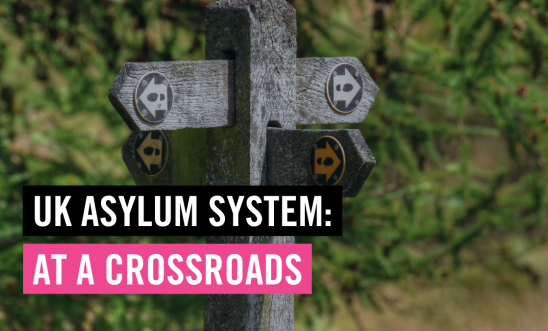
At a crossroads: The future of the UK’s asylum system

For years, Amnesty International UK has been urging the UK government to reform the asylum system. Bureaucratic delays, backlogs and a refusal to process claims have turned an already difficult journey for people seeking asylum into an impossible maze.
Previous governments have passed the buck on their responsibility, hoping someone else will pick up the pieces. But now, the UK is at a crossroads.
The current government has taken a step in the right direction, scrapping the disastrous and cruel Rwanda scheme and committing to clear the backlog of asylum claims. Yet we must urge them to do more. More than 100,000 asylum claims have been left in limbo, some dating back years. The question remains - will the UK build an asylum system that is both fair and efficient? Or will the Home Office continue down the same disastrous path?
Let’s break it down.
Fairness and efficiency: two sides of the same coin
At its core, fairness means treating people with dignity and ensuring their rights are respected. It means evaluating each claim based on individual circumstances, free from bias and without judgement. Being efficient means doing this without wasting time, energy or money.
But - fairness and efficiency are not in competition. They go hand in hand. When people are treated fairly, they can engage better with the system and decision-making processes, and resources are freed up. And an efficient system means refugees aren’t left in limbo for years but able to move on with their own lives, and rebuild.
Five steps towards a better system
So, what needs to change? We have laid out five steps the UK government should take to build a fair and efficient asylum system:
1. A single consistent process:
Wherever someone is from, and however they have arrived, all asylum claims should go through the same process. This would get rid of bureaucracy and inconsistencies that cause some claims to be delayed or mishandled.
2. Accessible legal aid:
All people seeking asylum should have access to competent legal representation to ensure their claims are clearly and fully presented. Legal aid should be paid at rates that achieve this by reflecting the time required to properly assist people to understand and engage with the system.
3. Decisions based on fact and law:
Every asylum claim should be decided based on what the evidence shows and in full compliance with international law.
4. Clear responsibility:
Each person should have a designated official responsible for their case. This person should have the power to grant asylum when the evidence is clear or pause it if more information is needed.
5. Indefinite leave to remain:
Once someone is recognised to be a refugee and granted asylum, the general practice should be to grant indefinite leave to remain. This would allow people to move on with their lives and plan their futures with certainty. It would also cut down the administrative burden on the Home Office which would otherwise have to process renewals.
Moving Forward
As we stand at the crossroads, the path ahead is clear - fairness and efficiency go hand in hand. The UK government's first steps provide real opportunity, but they must be followed by real, lasting reform. This is about offering people the chance to rebuild their lives in safety and with dignity.
Our blogs are written by Amnesty International staff, volunteers and other interested individuals, to encourage debate around human rights issues. They do not necessarily represent the views of Amnesty International.
0 comments